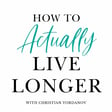![How Much Weight Training is Too Much? [Preview clip from my coaching program] image](https://media.zencastr.com/cdn-cgi/image/width=54,quality=85/image-files/5f0ae659d2048f003706f897/2882b1f2-9c23-4577-bc24-4bceb06b7a87.png)
How Much Weight Training is Too Much? [Preview clip from my coaching program]
Are you following health trends that actually harm your body? In my eye-opening masterclass "The 7 Popular But Deadly Health Fads," I reveal how common health practices promoted by influencers and gurus might be ravaging your gut, accelerating disease, and shaving years off your life.
Discover which popular diets, supplements, and health rituals are secretly sabotaging your health and learn what to do instead. I explain why these seemingly healthy habits are damaging your body and provide actionable alternatives for true longevity.
Register for free access to this essential health information at https://www.livelongerformula.com
-------------
Check out the first volume in the How to Actually Live Longer book series on Amazon: https://amzn.to/4dDXjxc
The Live Longer Formula is your go-to podcast for cutting through the noise and discovering practical, science-backed strategies to not just add years to your life, but to add life to your years. Hosted by longevity author and functional health practitioner Christian Yordanov, this podcast dives deep into the truths (and myths) behind longevity, health optimization, and addressing chronic health problems.
Each episode offers actionable insights drawn from the host's own research, clinical practice, and personal journey, helping you make informed decisions to restore and enhance your health. Whether you're interested in reducing stress, boosting your energy and mental performance, improving your gut health, or simply looking to optimize your diet and lifestyle, this podcast delivers the tools you need to live a healthier, longer life.
